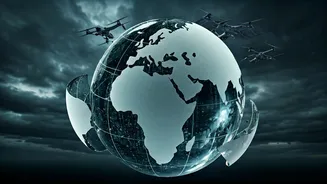Cyber Warfare Threats
Microsoft's warning illuminates a concerning trend: the utilization of AI as a cyber weapon by Russia, China, and Iran against the United States. This
declaration emphasizes the escalating nature of digital warfare, where technological advancements are being leveraged for strategic advantage. The employment of AI in this context signifies a shift towards more sophisticated and autonomous cyberattacks, posing new challenges for cybersecurity. Nations are now competing not only in traditional military capabilities but also in their digital prowess, making cyber defense a critical component of national security. The implications of these advanced cyber threats extend far beyond mere data breaches; they encompass the potential for disrupting critical infrastructure, manipulating information, and influencing geopolitical events. This ongoing cyber competition stresses the urgent need for international cooperation and the development of robust defenses to mitigate the potential damage from these threats.
Political Commentary Analysis
Tony Abbott's remarks to NDTV regarding Donald Trump's approach to India's tariffs provide a critical view of diplomatic strategies. Abbott suggested that Trump may have miscalculated his tactics, especially concerning tariff policies with India. This observation underscores the complex economic ties that shape international relations, revealing how tariff decisions can impact the relationship between countries. The dialogue about Trump's approach highlights the significance of economic policies in fostering or hindering diplomatic progress. Abbott's analysis adds an additional layer to our comprehension of how nations conduct economic affairs. His insights underline the necessity for deft diplomacy and thorough consideration of the far-reaching effects of economic policies on global relations. These dialogues contribute to the continual reevaluation of how nations interact and the effects of their decisions on the world stage.
Future Leadership Projections
Tony Abbott's prediction that the Indian Prime Minister will likely assume leadership in the free world within the next 40 to 50 years introduces an optimistic outlook for India's future on the global stage. This prediction highlights the rapidly evolving global order and the potential of India to have a major role in international governance. Such a prediction is based on factors such as India's economic growth, demographic strengths, and increasing influence in global forums. The statement implies a shift in power dynamics, suggesting that India could take on a prominent leadership role in shaping global policies and initiatives. This perspective reveals the expectations and discussions surrounding India's potential rise, underscoring its significant role in the ongoing international conversation. The observation implies that India may be on track to attain a more central role in global affairs.
Historical Diplomatic Efforts
The revelation of secret Russian files, which indicate that Moscow and the United States attempted to bridge gaps, underscores a hidden narrative of historical cooperation during the Cold War. These documents provide insights into behind-the-scenes endeavors to foster understanding between the two superpowers, demonstrating attempts to lower tensions. The documents also provide an interesting perspective on the challenges and strategies of diplomacy and the determination required to build relationships under the most challenging circumstances. This information reveals that even during times of significant conflict, communication and collaboration occurred, which ultimately had an impact on the course of global relations. These attempts represent the often-hidden aspects of diplomacy, demonstrating the subtle intricacies and long-term implications of trying to build relationships in international politics.
Social Media Commentary
The social media jabs directed at Rahul Gandhi by US singer Mary Millben, who expressed sentiments like 'Return To Your I Hate India Tour,' showcase the usage of social platforms in political discourse. This occurrence underlines how online platforms can become avenues for expressing opposing viewpoints and political disputes. Millben's commentary highlights the intense nature of opinions. These remarks demonstrate the impact that social media has on political communication and public image, along with its ability to generate disputes. It reveals the fast-paced and occasionally divisive nature of public discussions. Such interactions contribute to the changing media landscape and how political messages are constructed, distributed, and received. This reveals how opinions and disagreements can quickly escalate through social media.















